34 Evidence-Based Benefits of Spinach
What is Spinach
There is an ongoing debate as to whether or not spinach should be considered a superfood, but many studies prove its outstanding health benefits.
Spinach is a delicious addition to salads and soups and a great way to slim down.
While spinach may not be as popular as kale, its green leafy vegetable brother, it can be easily added to any diet, including the Paleo Diet, protein diets (since leafy green vegetables are allowed), and the Mediterranean Diet.
One of its greatest benefits is that you don’t even have to cook it. All you have to do is just add a few spinach leaves to your meals.
History
Persia is considered the birthplace of spinach.
Ancient Persians cultivated this vegetable long before Anno Domini.
Crusaders brought spinach to Europe during the Middle Ages.
Spanish monks were the first ones to cultivate spinach and make it popular in Europe.
In the sixteenth and seventeenth centuries, spinach bread and spinach juice were especially popular.
This type of bread was baked from the flour derived from spinach seeds, while the juice was widely used as a fancy addition to various meals.
Spinach juice was widely used to color butter and different creams and sauces.
Besides its natural coloring properties, the juice also served as a potent source of vitamins, which is why it spread widely across Europe.
Since the health benefits of spinach are unknown to many people, spinach is not as popular as kale, which has been a food trend in the United States since the 2010s.
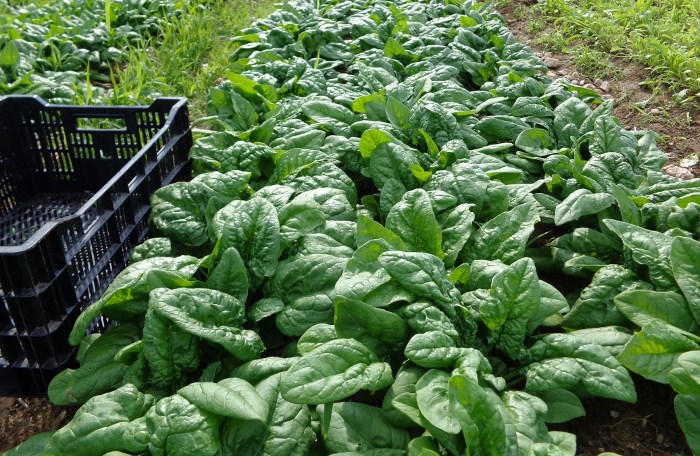
How Spinach Grows
It’s best to grow spinach in well-drained soil with a pH of from 6.5 to 7.
It’s also recommended to add compost or composted manure to the soil so that it can be as organic as possible.
If you plan to grow spinach twice a year and have this vegetable year-round, plant spinach seeds from four to six weeks before your last frost in the spring and then about six to eight weeks before the first frost in the fall.
The space between spinach plants must be about twelve inches to ensure the leaves reach their full size.
If your spinach has soft leaves, you must make it grow faster by adding nitrogen-rich soil additives, such as blood meal or cottonseed meal.
Composted manure and liquid fertilizers can also be used before planting to ensure full, quick, and strong growth.
Note that warm weather causes spinach bolting, which makes the vegetable’s leaves taste bitter when it’s flowering.
When this vegetable begins to bolt, its leaves taste bitter, and the plant is ready to be pulled.
Bolting spinach looks tall and fragile when the flowering process begins.
Heat (higher than 75° Fahrenheit) speeds up spinach bolting.
The most preferred temperature for the best growth is between 35° and 75° Fahrenheit.
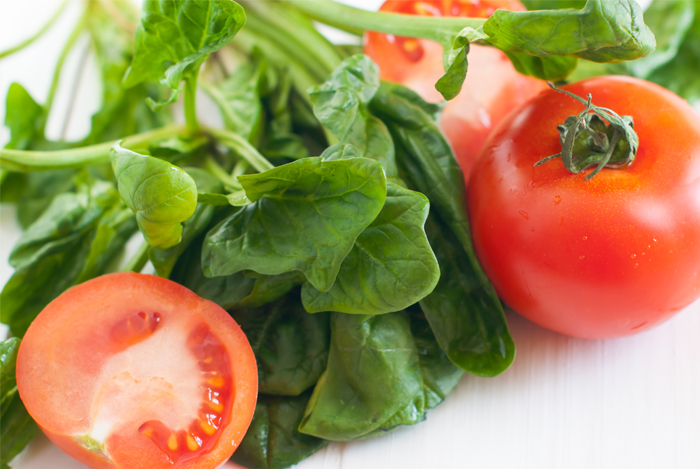
Varieties
The most common varieties of spinach are smooth-leaf, crinkly savoy, and semi-savoy.
Unusual varieties can often be found at specialty grocers and at farmers’ markets (especially in the United States, France, Italy, Spain, and China).
For example, baby spoon spinach and red spinach are not as popular as the above-mentioned types, but they are also used in food.
Smooth-leaf spinach can be recognized by its flat, spade-shaped leaves.
It’s much easier to clean than crinkly savoy and semi-savoy spinach.
Due to its availability, smooth-leaf spinach is the most common choice of commercial producers of canned and frozen spinach.
You can easily find this variety sold fresh at grocery stores.
Crinkly savoy spinach has curly and crinkly leaves and is dark green in color.
You can recognize this type of spinach by its crispness.
It is very difficult to clean.
Semi-savoy spinach is similar to crinkly savoy in terms of crispness, but it is not as difficult to clean.
This type of spinach is cultivated to sell fresh and also for processing.
Baby spoon spinach has a rich green color and is similar to savoy, but compared with crinkly savoy, it is much smaller in size.
It’s just as crispy as regular savoy but sweeter.
Red spinach, the rarest variety of spinach, also has a rich green color, while its leaves are round and thick.
The center of red spinach leaves is red, which explains its name.
It’s very succulent and sweet.
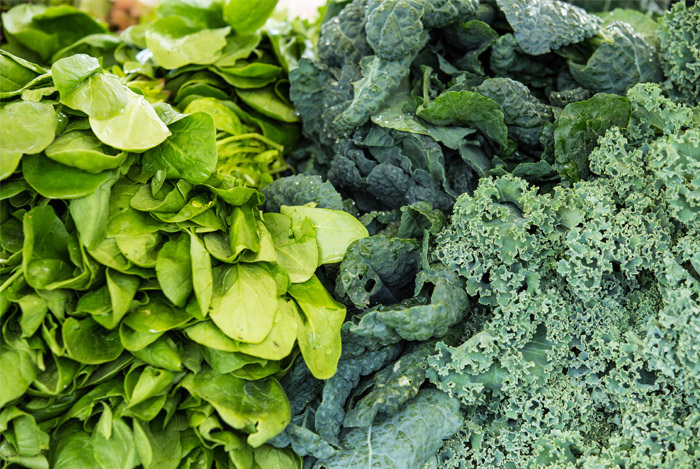
Interesting Facts
- Spinach is widely used in cooking.
- Colorants, especially green and rich green types, as well as preservatives and various spices, are often made of spinach.
- Spinach promotes better digestion of protein.
- China is the world’s largest spinach producer, accounting for 85% of global production.
- It’s best to eat fresh spinach for the most health benefits.
- California is the largest producer of spinach in the United States, accounting for more than 74% of fresh spinach in the country.
- Artists in the Middle Ages extracted green pigment from spinach to use as paint or ink.
- Popeye, a fictional cartoon character created by Elzie Crisler Segar, eats spinach all the time in theatrical and television animated cartoons.
- There is even a statue dedicated to Popeye in Crystal City, Texas.
- China honors spinach’s long history, and many Chinese people still refer to it as “the Persian Green.”
- English people referred to spinach as “the Spanish vegetable” because the Moors brought it through Spain.
- National Spinach Day is March 26.
Nutritional Facts
Spinach is very low in calories, while its content of vitamins, minerals, and phytonutrients make it a perfect product whether you’re looking to lose weight, gain muscle, or maintain good health.
You don’t have to worry about getting fat, and your body is getting a rich variety of beneficial nutrients.
Spinach is a source of such vitamins as K, A, C, B2, B6, and E, and it’s also rich in potassium, magnesium, folate, iron, calcium, iodine, phosphorus, zinc, copper, fiber, healthy omega-3 fats, and protein.
Spinach is made up of 91.4% water, 3.6% carbs, 2.9% protein, and 0% fat.
A hundred grams of spinach has only twenty-three calories, which makes it an excellent choice for people who want to slim down (1).
In fact, spinach has very few calories, even fewer than such “fat burners” as grapefruit, Brussels sprouts, asparagus, and broccoli.
A hundred grams of spinach provides you with 3.6 g of carbohydrates, 2.2 of which are dietary fiber.
It also contains 0.4% sugar, which is composed of glucose and fructose.
Spinach is high in insoluble fiber, which improves the functioning of your digestive tract by helping move food through the digestive system more quickly.
Accordingly, eating spinach helps prevent constipation (2).
Spinach also contains about 30% of soluble fiber, which prevents your body from absorbing fat and cholesterol that come with food (3).
The soluble fiber in spinach also regulates blood sugar and cholesterol levels and helps eliminate toxins from your body (4, 5, 6).
Spinach is appreciated for the high amount of protein in its leaves.
Among vegetables, only peas and beans contain more protein than spinach.
Spinach has between 0.5% and 1.4% of carbs in its leaves and about 2.1% of nutrients, with potassium making up most of this amount.
Spinach has a glycemic index of 15, which is why it can be considered a perfect product to promote weight loss and get rid of cellulite (7).
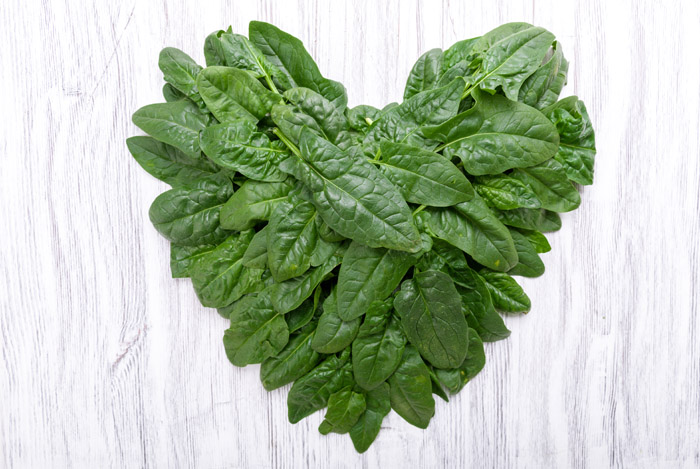
Health Benefits of Spinach
Numerous studies have proven that spinach has a number of positive effects on the human body.
By consuming spinach regularly, you get lots of vitamins, minerals, and other nutrients.
Spinach contains vitamins A, C, and K, B group vitamins, potassium, magnesium, iron, various antioxidants, lutein, zea-xanthin, fiber, omega-3 fatty acids, and even protein.
Spinach is Rich in Potassium
Spinach is one of the best dietary sources of potassium.
A hundred grams contains 558 mg of potassium, which is 16% of the daily value.
By contrast, a hundred grams of bananas (which has always been considered the champion of potassium) contains 358 mg of potassium.
Potassium is responsible for preserving bone mineral density as well as retention of muscle mass (8, 9).
Potassium is also well known for its properties to prevent the formation of kidney stones as well as control heart rate and blood pressure (10, 11, 12).
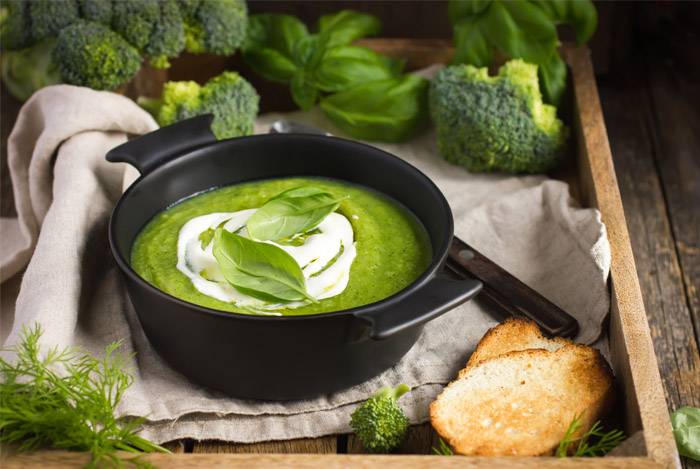
Spinach and Magnesium
Spinach is also the richest dietary source of magnesium, containing 79 mg of this mineral per hundred grams (20% of daily value intake).
Magnesium is important in protein synthesis, regulating neural activity and maintaining nerve function as well as regulating blood pressure and blood sugar levels (13, 14, 15, 16).
Rich in Iron
Spinach is the richest source of iron among other vegetables.
One hundred grams contains 2.7 mg of iron, which helps regulate red blood cell production and prevents anemia and hair loss (17).
Spinach and Antioxidants
Spinach leaves contain a great variety of antioxidants: vitamins A and C as well as polyphenol antioxidants, lutein, beta-carotene, and zeaxanthin.
Such a rich and potent antioxidant combination protects your body from oxygen-derived free radicals and reactive oxygen species (ROS) (18, 19).
These two affect the aging process and the development of various diseases.
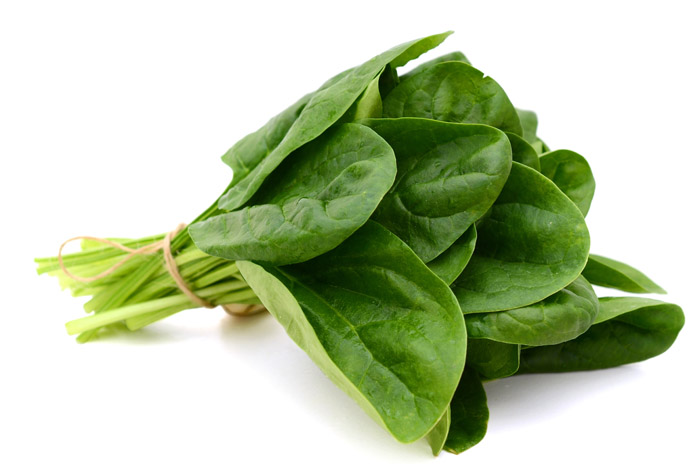
Spinach is Rich in Protein
For a vegetable, spinach has a surprisingly impressive amount of protein — 2.9 g per one hundred grams.
In fact, proteins in spinach are easily digested and broken down by enzymes into amino acids that are especially vital if you’re working out in the gym (20).
Kaempferol and Nitrates
Spinach is high in an antioxidant called kaempferol, which lowers the risk of developing cancer and various chronic disease.
At the same time, spinach promotes good heart health thanks to its high content of nitrates (21, 22).
Spinach and Eye Health
Zea-xanthin is a crucial dietary carotenoid, which is partially absorbed into the eyes to prevent age-related macular disease.
Thus, zea-xanthin provides your eyes with antioxidant and protective light-filtering properties (23).
Lutein contained in spinach improves eye function and prevents degeneration of the retina.
It’s especially beneficial to eat spinach regularly if you spend a lot of time in front of your PC or laptop (24).
Lutein reduces tension in the eyes by accumulating in the eye tissues.
In fact, luteinalso prevents eye problems that occur with aging (25).
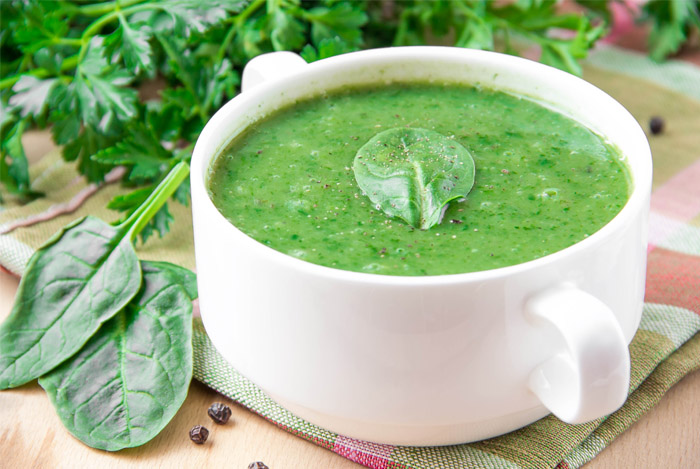
Spinach is Rich in Vitamin A
Vitamin A contributes to eye health and maintains your skin in good condition.
Spinach is extremely rich in vitamin A, as a hundred grams provide 9376IU of vitamin A, which is 188% of the daily value intake (26, 27).
Spinach and Vitamin K
Spinach leaves are also very rich in vitamin K, as a hundred grams contains 604% of the daily value intake.
Vitamin K is vital for your health since it strengthens the bones and stimulates the bones’ osteotropic activity (28, 29).
Spinach and Alzheimer’s Disease
Vitamin K also reduces neural damage in the brain in patients suffering from Alzheimer’s disease.
Vitamin K is important for brain health, which is why it can even prevent Alzheimer’s if consumed regularly (30, 31).
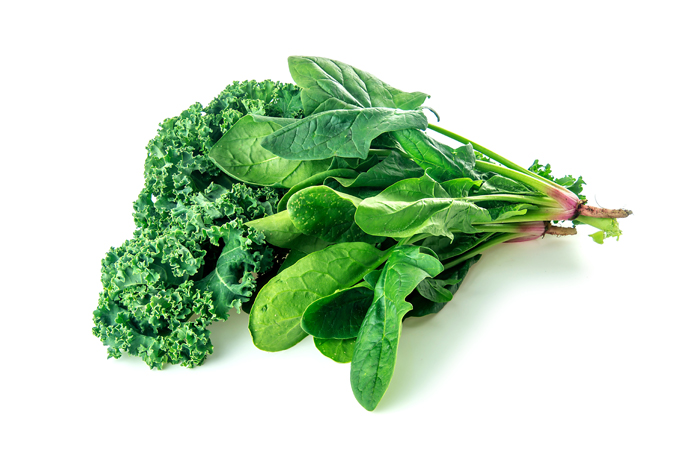
Spinach and Energy Levels
Spinach is also very rich in B-group vitamins: B1 thiamin (0.1 mg), B2 riboflavin (0.2 mg), B6 (0.2 mg) as well as B9 folate (149 mcg) and B3 niacin (0.7 mg).
Thus, the vitamin B complex keeps your energy levels active throughout the day (32).
Spinach and Immune System
Spinach is high in vitamins A and B, and a hundred grams of spinach contains 28.1 mg of vitamin C, which is 47% of the daily value intake.
In comparison, a hundred grams of grapefruit has just a little more vitamin C than spinach — 31.2 mg.
Vitamin C is a vital antioxidant that boosts your immune system and helps your body fight off infections and cleanses it from oxygen-derived free radicals (33, 34).
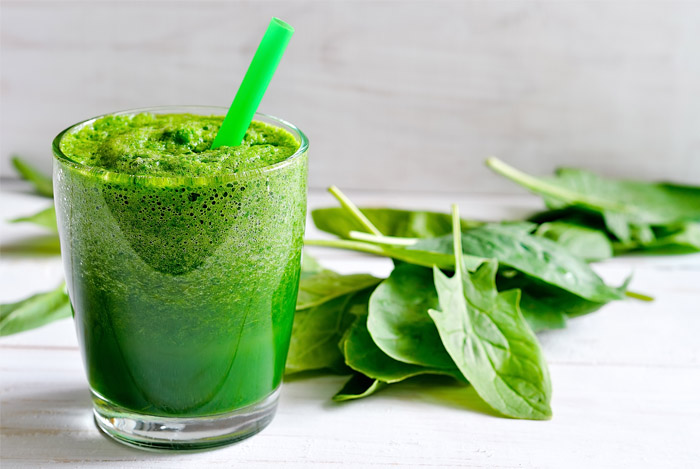
Heart Disease and Anemia
Spinach is also a good source of healthy omega-3 fatty acids, which your body utilizes for energy and helps prevent various heart diseases and regulates blood pressure.
Potassium also regulates heart rate and blood pressure (35, 36, 37).
Since spinach is high in iron (2.7 mg per 100 grams), you prevent iron deficiency anemia by eating spinach every day (38).
Spinach and Digestive Tract
By eating spinach, you can forget about constipation, since spinach promotes regularity, thanks to its high content of fiber and water.
Spinach contains both soluble and insoluble fiber, both of which have beneficial effects for your health.
While insoluble fiber prevents constipation and improves the functioning of your digestive system, soluble fiber prevents your body from absorbing fat and cholesterol from food (2, 3).
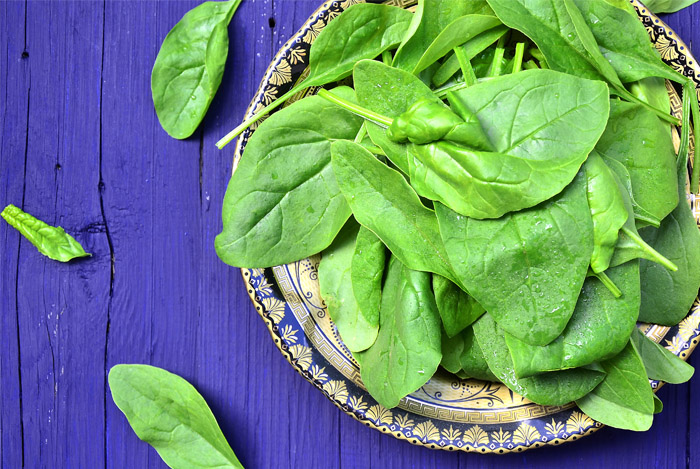
Blood Sugar and Cholesterol
Soluble fiber also regulates blood sugar and cholesterol levels and helps your body eliminate toxins and feel good throughout the day (4, 5, 8).
Spinach and Diabetes
Spinach has protective properties against diabetes.
If you have diabetes, you can lower your glucose levels by eating spinach, strengthen insulin sensitivity, and prevent oxidative changes in the body thanks to spinach’s rich content of an antioxidant called alpha-lipoic acid (39, 40).
In fact, people suffering from diabetes can get their peripheral neuropathy and/or autonomic neuropathy decreased thanks to alpha-lipoic acid (41).
However, there is no evidence that any of the diabetes management benefits are true for the oral intake of alpha-lipoic acid since most studies were carried out using intra-venous alpha-lipoic acid.

Spinach and Cancer
Spinach can also prevent cancer, thanks to its high content of chlorophyll, which eliminates the carcinogenic effects of heterocyclic amines.
These are released when foods are exposed to high temperatures.
So adding spinach to your BBQ sauce would be a great idea (42, 43, 44).
Spinach also protects against lung cancer because it is high in vitamin A.
Whether you’re a smoker or a former smoker or are simply exposed to tobacco smoke, consuming spinach reduces the risk of developing lung cancer (45, 46).
Spinach and Asthma
Beta-carotene, which spinach has in abundance, lowers the risks of developing asthma.
Thus, eating spinach and other dietary sources of beta-carotene regularly can prevent asthma (77).
A hundred grams of spinach contains 5626 mcg of beta-carotene.
By contrast, a hundred grams of apricots contains 1094 mcg of this vitamin.
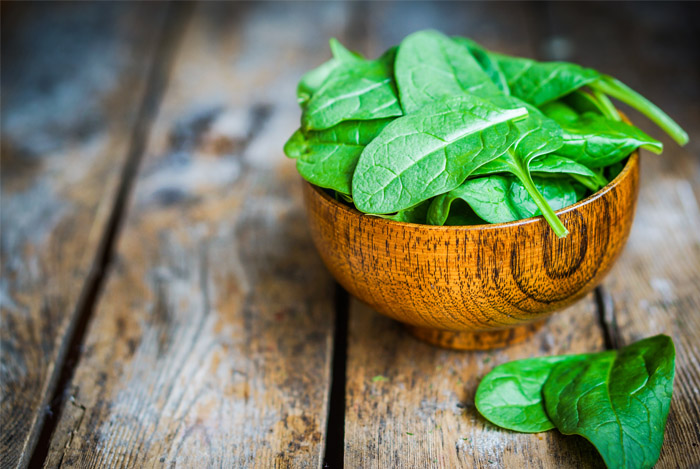
Spinach and Pregnancy
Spinach is especially useful for pregnant women since its high content of folate ensures normal development of the offspring’s nervous system.
Folate also prevents neural tube defects (47, 48).
Folate also provides normal tissue growth and helps maintain proper cell function.
So if you’re pregnant, introducing spinach into your diet is definitely a good idea (49).
Spinach and Bones Health
Thanks to its rich content of vitamin K, spinach strengthens your bones and acts as a modifier of bone matrix proteins when consumed regularly.
Spinach also provides better calcium absorption and even helps maintain your calcium levels in check (28, 50, 51).
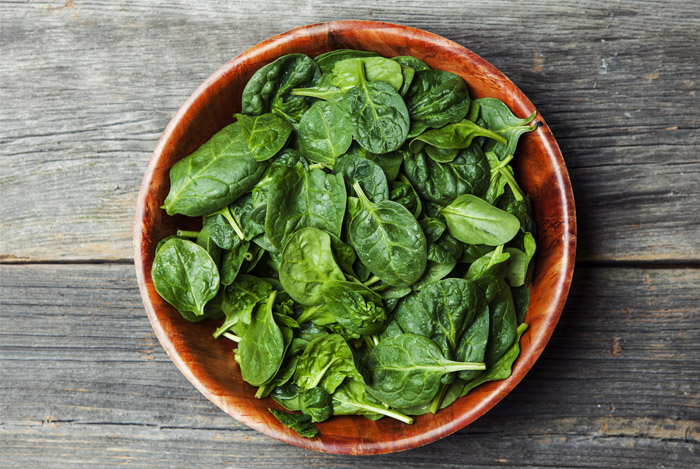
Spinach and Your Skin
As mentioned above, spinach is a rich source of vitamin A, which is vital for maintaining your skin and hair in a beautiful and healthy state.
Vitamin A helps in sebum production to keep your hair moisturized (52).
This vitamin is also necessary for the development of all bodily tissues, including skin and hair, both of which never stop to regenerate.
Besides, vitamin C found in spinach is vital in producing and maintaining collagen, which gives your hair and skin’s proper structure (53).
Spinach and Hair Loss
Spinach is also very rich in iron, which means you can prevent hair loss.
Iron deficiency is one of the most common causes of hair loss, so consuming iron regularly helps strengthen hair follicles (54, 55).
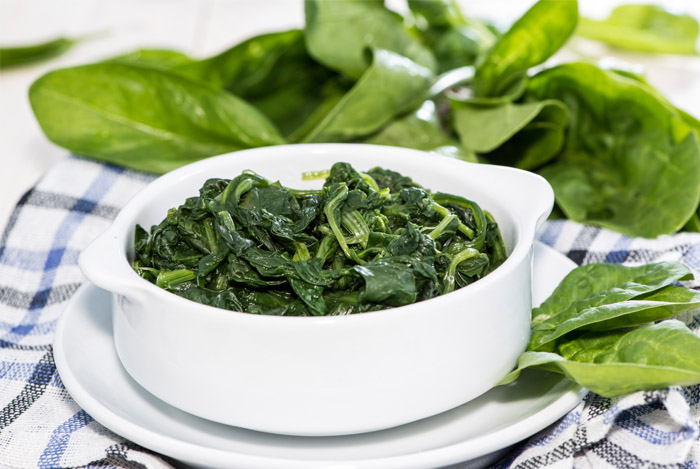
Spinach and Thyroid Gland
Due to its high iodine content, spinach is also recommended for people suffering from problems with the thyroid gland.
Iodine is essential for making thyroid hormones, and thyroid cells are the only cells in the body that can absorb iodine (56, 57).
Spinach and Body Toxins
Spinach has properties to eliminate toxins from the human body.
With the help of spinach, you can regulate your metabolism, raise your hemoglobin levels, and boost your energy (58, 59).
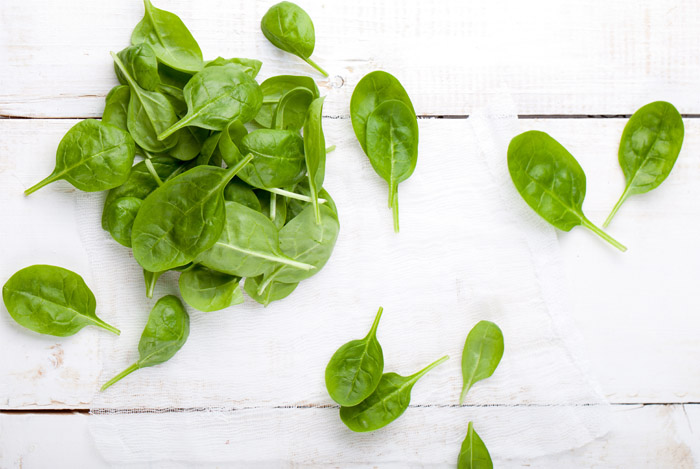
Spinach is Easily Digested and Absorbed
Spinach can be easily digested and absorbed, meaning you’ll never feel bloated or constipated (60).
Spinach is Safe for Children
Thanks to its digestibility and lightness, spinach is recommended for children, people with poor appetite, and individuals recovering from complex surgical procedures and chemotherapy (61).
Spinach and Inflammation
Spinach has anti-inflammatory properties, which is why it’s often recommended by dentists as a supportive measure to treat inflammation in the gums and throat (62).
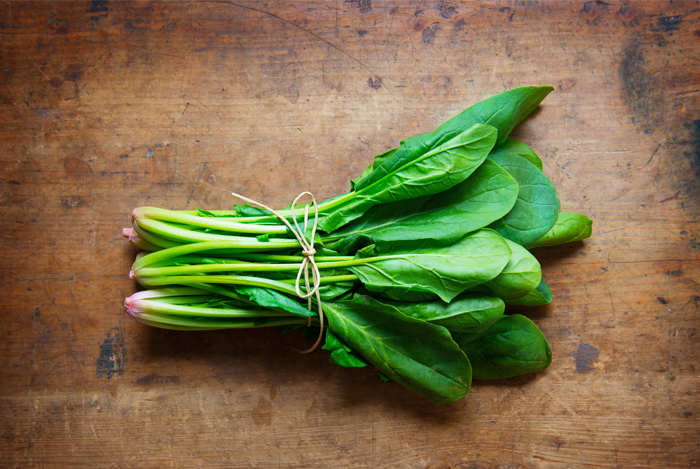
Spinach and Weight Loss
Spinach juice is particularly healthy and can be consumed both separately and in combination with other vegetable juices, such as carrot juice.
It increases your work efficiency, boosts the immune system, and promotes weight loss (63, 64).
Spinach and Burns
Spinach is also effective in treating burns.
For this purpose, it’s recommended to use a special spinach paste, which can be prepared by boiling spinach leaves in olive oil.
The resulting mix is applied to the burned areas (65).
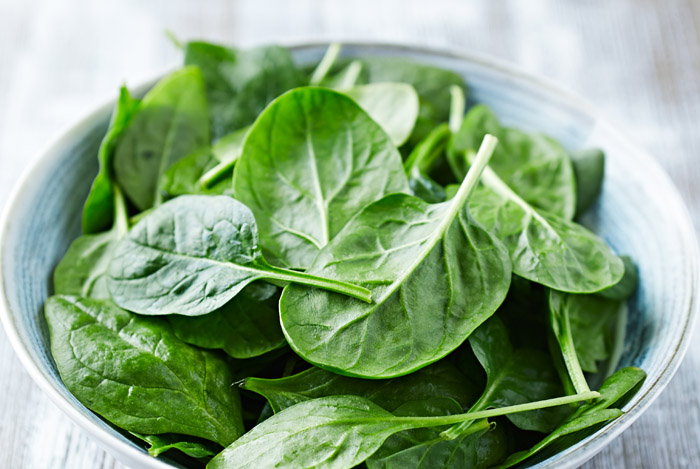
Spinach and Neurological Issues
Thanks to its high content of antioxidants and potassium, spinach offers a variety of neurological benefits, such as preventing neural or cognitive decline and boosting concentration, cognition, and neural activity (66, 67).
Spinach and Cataracts
Spinach reduces the risk of cataracts due to its high content of such strong antioxidants as lutein and zeaxanthin.
These two antioxidants reduce the negative effects of free radicals and UV rays, both of which lead to cataracts (68).
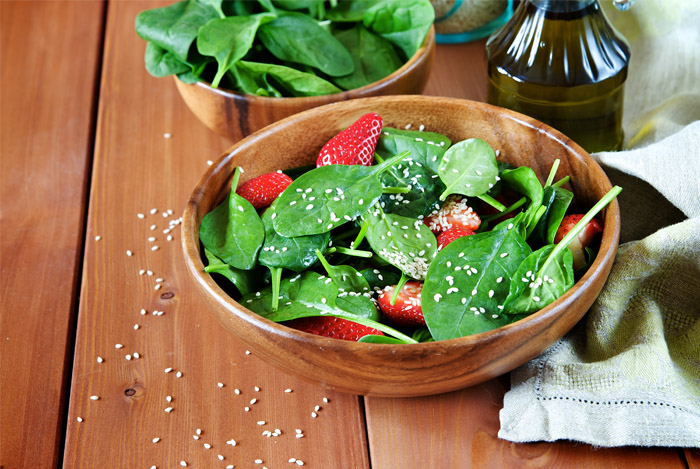
Spinach Curbs Cravings and Hunger
Spinach also boosts your entire metabolism, making every organ in your body function at its optimal level.
Besides, thanks to its high content of thylakoid, spinach curbs cravings and hunger, both of which help you lose pounds (69).
Spinach is an Anti-Ulcerative Vegetable
Spinach protects the mucous membrane of the stomach, which means it lowers the risk of developing gastric ulcers.
In addition, glycocyclerolipids contained in spinach strengthen the lining of the digestive tract (70).
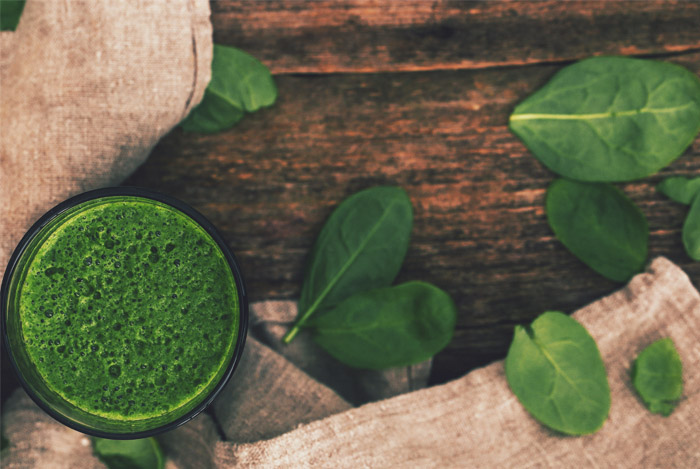
Atherosclerosis and Strokes
Lutein, which spinach has in abundance, lowers the risk of atherosclerosis, heart attacks, strokes, and other heart diseases.
Spinach proteins also help reduce cholesterol and cleanse the blood vessels from other fat deposits (71, 72).
How to Buy
Spinach is one of the dirtiest vegetables, since it may grow in soils containing a salt of heavy metals and other poisonous and harmful substances.
That’s why spinach must be grown far away from harmful industrial areas and garbage dumps.
If you buy spinach at grocery stores, it’s recommended to ask the seller where it was imported from and how it was grown.
When choosing spinach, you need to consider a few things regarding its freshness.
Color
The leaves must be juicy green in color and bright, which means it was delivered to the grocery store straight from the producer and not stored at some warehouse for days or weeks.
In fact, the juicier the color, the more vitamin C present.
Smell
Fresh spinach has a pleasant smell.
If the smell is unpleasant (especially the leaves) or has no smell at all, don’t buy it, as most likely it has been stored for several days.
Leaf structure
Spinach leaves should be a little crunchy.
You can check it quite easily: just press the tip of the spinach between two fingers and squeeze a little.
If you feel a slight crunch and crack, this spinach is fresh and was pulled from the garden no more than 12 hours ago.
No yellow or black spots
If spinach has yellow or black spots, it means it has been damaged by insects or processed with anti-pest agents.
Don’t buy it.
Fresh look
Spinach shouldn’t have any defects; its leaves must be smooth and juicy.
So don’t buy crumpled or withered spinach, as it may harm you.
Stem width
If the spinach’s stem is too wide, it means this spinach is overripe and too bitter to eat.
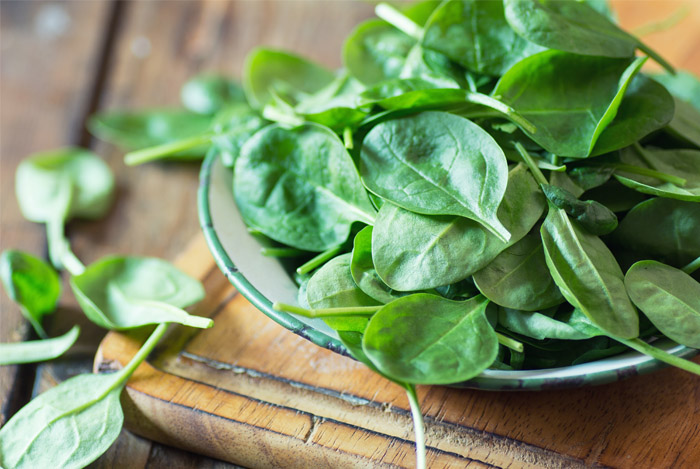
How to Store Spinach
It’s best to consume spinach within twelve hours after you buy it.
You can store spinach in the fridge at a temperature no higher than 5° Celsius (41° Fahrenheit).
You can put spinach into a bag or container to preserve its freshness, but don’t wash it before putting it into the fridge, as it will substantially reduce the length of time it can be stored.
Even if you follow all these tips, spinach shouldn’t be stored for more than three days, as it may spoil and be harmful to human health.
You can freeze spinach but for no more than four months because longer periods may reduce its health benefits.
How to Add More Spinach to Your Diet
Add Spinach to Smoothies
Adding spinach to your smoothie is a great way to start your day with a boost of energy, thanks to its high content of B-group vitamins.
Use Spinach as a Topping for Pasta
If you’re a fan of pasta, you can chop spinach into small pieces and sprinkle it over your pasta.
You can have delicious pasta packed with healthy nutrients.
Spinach is Great Addition to Meat
Meat and spinach are great friends, as they taste amazing when combined.
You can add some spinach to your grilling pan, and your family or friends won’t even notice the taste of this vegetable!
Add Spinach to Salads
You can always add spinach to your salads to spice them up and have more vitamins and minerals.
Add Spinach to Omelets
Since spinach promotes better digestion of protein, it would be a great idea to add spinach to your omelets.
Delicious and healthy at the same time!
Add Spinach to Soups
If you enjoy soup, adding spinach would make it even more delicious, and if you’re cooking chicken noodle, the protein will be digested much better with spinach!
Use Spinach in Pizza
Who doesn’t love pizza?
You can make your pizza much healthier and not feel guilty after eating it, though, if you add some spinach to it.
In fact, you could also try smearing pureed spinach on top of your pizza instead of sauce to impress your guests.

Precautions
The most important precaution about such vegetables as spinach is freshness.
If spinach is stored for more than forty-eight hours (not in the fridge), harmful substances will grow on the leaves.
If you eat spoiled spinach, you risk becoming very sick.
Meals cooked with spinach shouldn’t be stored for long.
It’s best to eat such meals immediately after cooking.
If you tend to develop kidney stones, you shouldn’t eat much spinach because this vegetable has a high amount of calcium and oxalates, both of which cause kidney stones (73, 74).
If you’re taking blood thinners, you may want to steer clear of spinach, as it’s very rich in vitamin K1, which is important in blood clotting (75).
In fact, if you have any problems with your kidneys or urinary tract, you may want to avoid spinach altogether because it’s high in oxalic acid (76).
Don’t eat spinach (or eat in moderate amounts) if you’re suffering from any of the following: nephritis, kidney stone disease, gout, rheumatism, duodenum disease, and diseases of the liver and bile passages.

Conclusion
Spinach is a nutritious, low-calorie vegetable that helps with weight loss and offers a great number of health benefits, including prevention of cancer, diabetes, heart disease, and anemia.
It’s highly recommended to include spinach in your everyday diet and consume it fresh.
It’s very important to store spinach properly and buy only fresh leaves to avoid any potential harmful effects from spoiled spinach.
Spinach provides a rich variety of beneficial nutrients, including vitamins A, C, and K, B-group vitamins, potassium, magnesium, iron, folate, various antioxidants, lutein, zea-xanthin, fiber, omega-3 fatty acids, and even protein.
Spinach prevents cancer, heart disease, asthma, anemia, Alzheimer’s, helps manage diabetes, promotes a healthy digestive tract, regulates blood sugar and cholesterol, improves eye health, boosts the immune system, fuels your body with energy, and ensures a healthy pregnancy.
FDA Compliance
The information on this website has not been evaluated by the Food & Drug Administration or any other medical body. We do not aim to diagnose, treat, cure or prevent any illness or disease. Information is shared for educational purposes only. You must consult your doctor before acting on any content on this website, especially if you are pregnant, nursing, taking medication, or have a medical condition.
HOW WOULD YOU RATE THIS ARTICLE?
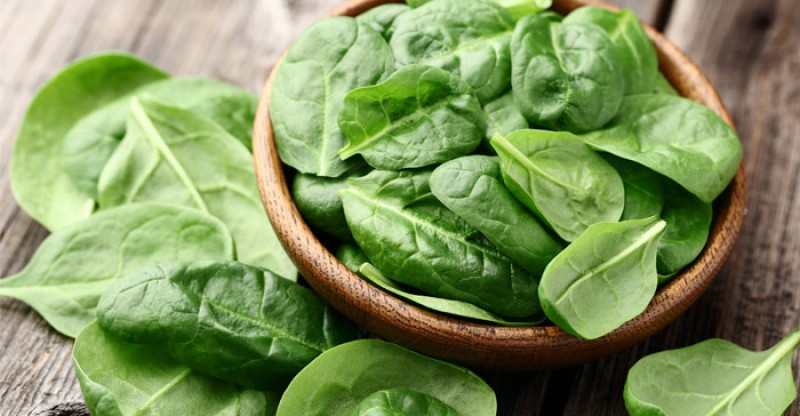






I wonder if spinach is still good in smoothies. It’s so popular now to make superfoods smoothies but doesn’t this spoil the benefits?
I’ve recently read that spinach is even more beneficial when eaten cooked, not raw. Is this true?
I would like to cook something with spinach as it’s boring to eat only salads but still want to receive all profit.
Oh, I love spinach and try to eat it every day mixing with other vegetables to get delicious salads. Since I included it to my usual meals, I have noticed that I feel better, look better, I have more energy…Now I advise all my friends to eat more spinach.
A very detailed and descriptive article about Spinach. Amazed to know it’s magnificent health benefits.
Very educative about spinach.Please send to my mail below.
Helen, Thanks for posting blog on health benefits of Spinach. I consume baby spinach about 4 days a week and use it not only for salad but also on smoothies. Your posting gave me lot of information on health benefits of spinach than that of i knew. Thanks again.
thank you for useful information for healthy life………thanks a lot.